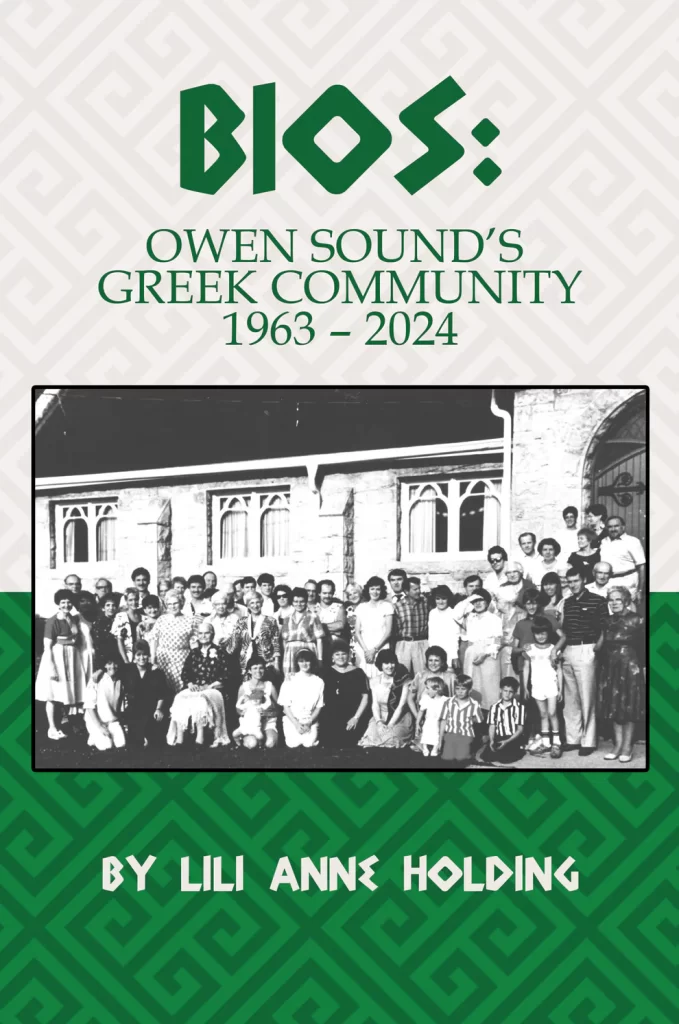History is more than a record of the past; it is a living testament to those who shaped it. In BIOS (1963-2024), the capstone of her trilogy on Owen Sound’s Greek community, Lili Anne Holding delivers a deeply personal reflection on a world that is fading but not forgotten. Following MYTHOS (1912-1932) and OYKOS (1933-1962), BIOS shifts from historical chronicle to memoir, capturing the final decades of a once-vibrant immigrant enclave through the lens of personal memory.
Holding guides readers through the textured landscape of Owen Sound’s Greek community: sun-drenched summers at Sauble Beach, the hum of family-owned restaurants, and the quiet rituals that bound these families together. These recollections form a larger story about the inevitable passage of time and the shifting contours of cultural identity. As the author of the foreword to BIOS, which I share below, I can attest to how Holding preserves this vital history with grace and insight.
Where to Get the Book:
BIOS is available for purchase through The Ginger Press.
Foreword to BIOS:
On first read, the title of Lili Anne Holding’s book gave me pause. “BIOS” literally translates to “life,” yet the manuscript reads like an obituary—a remembrance of family and community long passed but dearly remembered. Perhaps this should not have been so surprising; Greeks customarily emphasize the idea that life endures when confronted with loss. Greek funeral etiquette dictates that mourners greet each other with the salutation “ζωή σε μας” (life to us). Framed in this light, BIOS seems like a fitting title for the final chapter in Holding’s history of the Georgas family and Owen Sound’s now-dwindling Greek community. BIOS clearly conveys the author’s long-held aspiration to memorialize—indeed, immortalize—a history at risk of being lost.
This is the most personal book in Holding’s trilogy. Where MYTHOS presented the early history of Owen Sound’s Greek community in the third person, and OYKOS was written in Holding’s father’s voice, BIOS most clearly reflects its author’s positionality and perspective. We read a mature author sharing her journey of self-discovery. The reader encounters Holding as a young girl immersed in Greek Canadian culture, struggling to decipher the “Greek hieroglyphics” on her brown dinner bags and cottaging at Sauble Beach. We learn about the businesses she knew, the bands she loved, and the athletes she cheered. Holding shares her remembrances of anniversaries, retirements, and funerals, eating poached eggs on basketball night and singing Bobby Gimby’s “Ca-na-da” during Expo ‘67.
Yet, BIOS is as much about Holding as it is about her family and community. Holding’s memories act as vignettes in a larger story about the decline of a once-thriving Greek Canadian community. BIOS follows the latter years of the migrant entrepreneurs who first settled here—the restauranteurs, theatre operators, real estate investors, and politicians of the “Chicago of the North.” In doing so, it grapples with the reality of a fading community whose founders have passed and whose youth sought better prospects elsewhere.
Determined to preserve this storied heritage, Holding erects a bridge between past and present, inviting us to cross with her. Indeed, BIOS is as much a project of sustaining memory as it is one of self-authoring. We travel alongside Holding and her father on their pilgrimage to Aggelona, her Pappou’s village. We visit Paleopanagi, her Giagia’s hometown in Laconia. And we bear witness to Holding’s reflections on her grandparents’ migration journeys. Holding further traces the connections between the Peloponnese and Grey County, describing institutions established through migrants’ remittances. She endows meaning upon each banal and exceptional memory she recounts. Each story offers insight into the Georgas family and the rich history of Owen Sound’s Greek community. Each chapter reveals a different aspect of Holding’s unique “Greco-Canadian” identity.
BIOS is more than the Georgas family’s story or the story of Grey County’s Greeks; it is amateur local history at its best. It is a deeply personal story that evokes universal themes. “This is a story about a family,” Holding writes. “It could have been anybody’s story, but it was ours.” The “was” looms large. Perhaps another Greek funeral salutation is appropriate: “αιωνία η μνήμη” (may their memory be eternal).
Vasilis (Bill) Molos
Chair, Liberal Studies
University of Guelph-Humber
vasilis.molos at guelphhumber.ca
Publication Information:
Holding, Lili Anne. BIOS: Owen Sound’s Greek Community (1963-2024). Owen Sound, ON: The Ginger Press, 2024.
